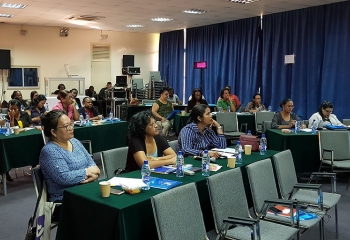Bath, Experiment, Hope and Waterloo Villages are rural communities in Guyana along the West Coast of Berbice River. Here, like most coastal areas in Guyana, complications during pregnancy or childbirth persist.
Ending maternal mortality is a nationwide development goal but progress is being threatened by the inadequate primary health care services in some communities.
Until last month, the 4,000 residents of these villages were among those who did not have a health centre nearby. They often had to travel several kilometres to receive medical help.
On February 5, 2016 a health facility was officially handed over to the community, ending years of poor access to basic health care. The health centre was built with support of USD112,800 from the Caribbean Development Bank' (CDB) Basic Needs Trust Fund (BNTF) Programme. The Government of Guyana contributed USD21,150 and the community made an in-kind contribution of USD7,000.
“CDB is pleased to have supported the Construction of the health centre at Bath, where, until now, families did not have easy access to basic health care. A health facility close to home can help lift the community out of poverty, secure the livelihoods of the many agricultural workers who live in the area, and give mothers and their babies a better chance of leading healthy lives," said Darran Newman, Portfolio Manager, BNTF, CDB.
The health centre, which was constructed through funding from BNTF.
The new health centre also helps the Government of Guyana in its efforts to improve sexual and reproductive health across the country.
The health facility has amenities to accommodate pregnant women and new mothers, including a delivery room—a key benefit for the 1,900 women in Bath, Experiment, Hope and Waterloo.
HIV remains a key development issue in Guyana, where 2.4% of the adult population was living with the virus in 2004. Health centres like this one will help the Government continue to make progress in the fight against HIV/AIDS. In a 2015 report, UNAIDS noted that, as of 2013, HIV prevalence among adults had declined to 1.4%.
The Experiment/Bath Village Health Centre can accommodate up to 70 patients each day and includes a room for Family Planning services, HIV Testing and Counselling; a consultation room with an examination space; a separate examination room; treatment room; and wards for males and females. There is also a designated area for delivering dental care.
The facility will also help create employment opportunities for trained health workers and savings for families who no longer have to pay for transportation to access primary health care.
“If you have the centre in the village, the chances of getting that person coming to the clinic are so much higher than if they have to travel long distances," said Dr. George Norton, Minister of Public Health, Guyana.
The Experiment/Bath Health Centre was built under the sixth cycle of BNTF.
Read more about BNTF
Explore more Stories of Change from BNTF interventions




